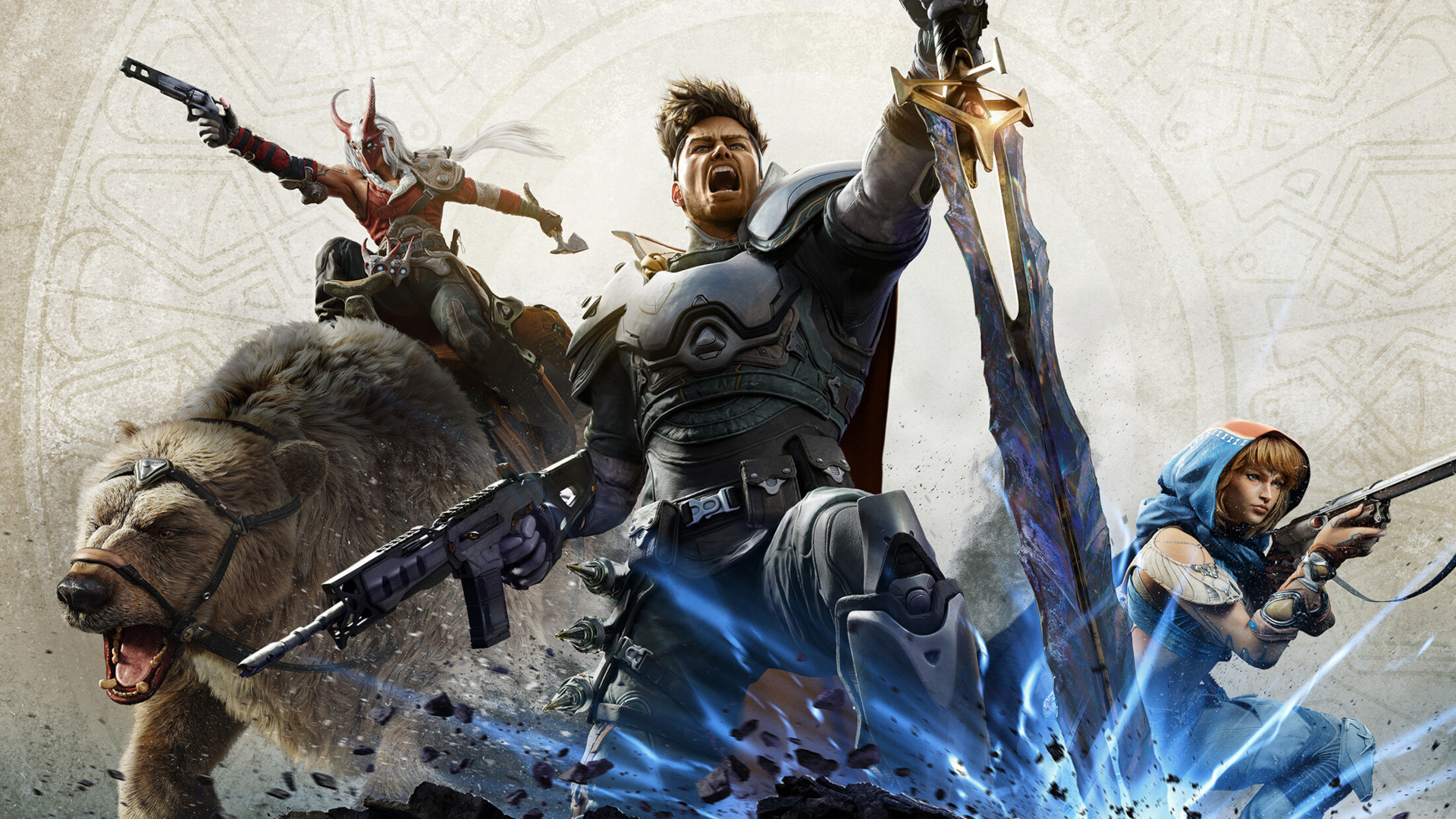The Essential Dennis Hopper
A trip down the late Easy Rider's career highway...
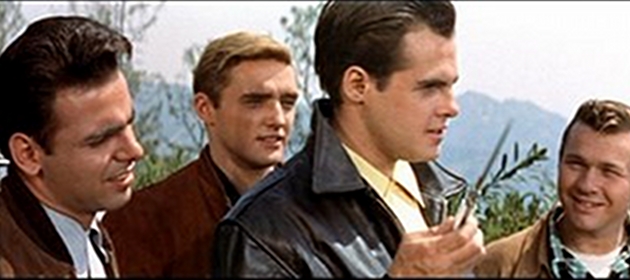
Rebel Without A Cause (1955)
Yes, that fresh-faced kid in the red jacket and slick hair really is Dennis Hopper. He was just 19 when he landed a small part opposite James Dean in Nicholas Ray's troubled-teen groundbreaker.
To be honest, it all looks a bit tame these days – these hep talking whitebread LA kids don't exactly ooze danger – but there are still standout moments of sleepy-eyed intensity from Dean to relish. The knife fight atop LA's Griffith Observatory – with a leering Hopper as part of the crowd – still looks great.
Hop Triv - Hopper and Dean became mates during filming – they would go on to appear together in Giant (1956) and Dean's death in a car wreck while filming that hit Hopper hard. “I imitated his style in art and in life,” he later said of Dean. “It got me in a lot of trouble."
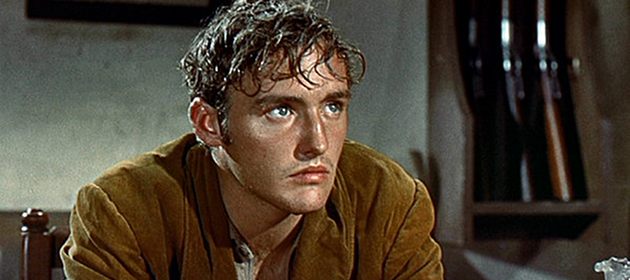
Gunfight At The OK Corral (1957)
Hopper's rep may have been as a counter-culture icon but he earned his keep in the occasional Hollywood biggie during his early years. He's the youngest of the outlaw Clanton family in the glossy Kurt Douglas-Burt Lancaster retelling of the Western legend, for example.
Already studying at the Actors Studio, Hopper was starting to obsess about method acting.
By the time he made From Hell To Texas (1958) he was asking for skywards of 100 takes in order to improv his role in the bog-standard western.
Director Henry Hathaway soon lost patience with the wannabe Brando and Hopper found parts tricky to come by over the next few years.
Hop Triv – Weirdly, Hopper actually was born and raised in Dodge City, Kansas, where OK Corral is set.
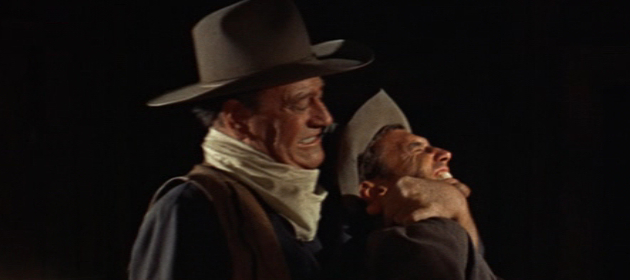
The Sons Of Katie Elder (1965)
John Wayne and Dennis Hopper? Surely some mistake? The hell it is! After a few years in the Hollywood Wilderness (he managed barely five films in the seven years before this one), director Henry Hathaway gave Hopper another chance.
It's another troubled teen role, but Hopper nailed it, allowing himself to be slapped around by both Wayne and his co-star Dean Martin.
It sparked a career comeback for him and suddenly Hollywood was knocking again. He'd even work with Hathaway and Duke again, reteaming with them for Wayne's Oscar-winning turn in True Grit .
Hop Triv – Ultra-conservative Wayne and super-liberal Hopper surprisingly got on pretty well. “I was and am good friends with his boys, so I became his very favorite pet ‘pinko'."
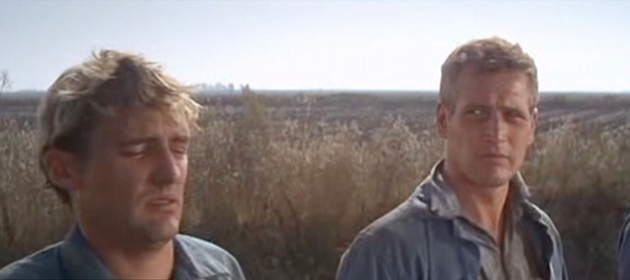
Cool Hand Luke (1967)
George Kennedy, Harry Dean Stanton, Joe Don Baker, Richard Davolos, Strother Martin... As ensemble casts of character actors clustered round a single big star go, you'd struggle to beat Cool Hand Luke 's.
Hopper is right in the mix as glistening-eyed youngster Babalugats, whooping and cheering as Newman chomps down all those eggs.
Hop Triv - Hopper got to indulge his Methody side when he, Paul Newman and the other actors playing the prison road crew really did tarmac a stretch of road...
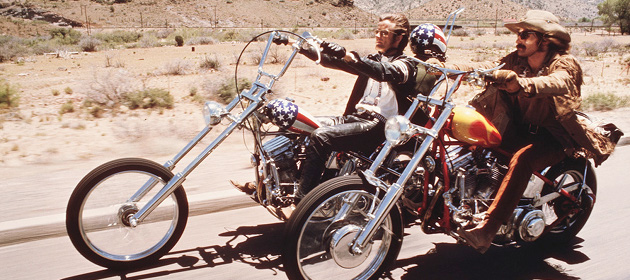
Easy Rider (1969)
The dope smoking, counter-culture road flick that defined Hopper. The back end of the film looks clunkily dated now, but the earlier scenes with Hopper, Peter Fonda and Jack Nicholson still shine, while the images of Billy and Captain America tearing down the highway on their bikes never grow old.
Scriptless and largely improvised on the spot, the shoot for Easy Rider was a legendary nightmare, but somehow – despite spending most of the shoot drunk or stoned off his face – Hopper's directorial debut worked. The film cost around $500,000 to make. It made $19 million.
“We made all of our money back the first week,” crowed newly crowned counter-culture king Hopper. “In one theatre.”
Hop Triv – The scene where Hopper, Fonda and Nicholson's characters smoke dope? They really are smoking dope...
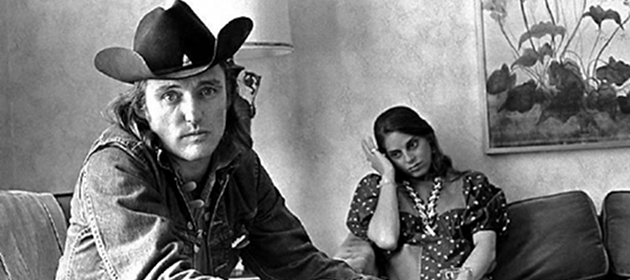
The Last Movie (1971)
Hopper's second feature as director. The baffling tale of a stuntman who hangs on in Peru after a Western finishes filming, it swirls drug-addled imagery and a story about native rituals into a godawful pretentious self-indulgent mess.
The Last Movie somehow won the Critics Prize at the Venice Film Festival, but tanked in cinemas, getting pulled after just two weeks in New York.
After one early screening, a projectionist was heard to mutter “They sure named this movie right because this is gonna be the last movie this guy ever makes.” He was nearly right – it would be 17 years before Hopper directed another American movie again.
Hop Triv – Hopper got the idea for the flick while filming The Sons Of Katie Elder in Mexico and originally wanted Montgomery Clift for the lead role.
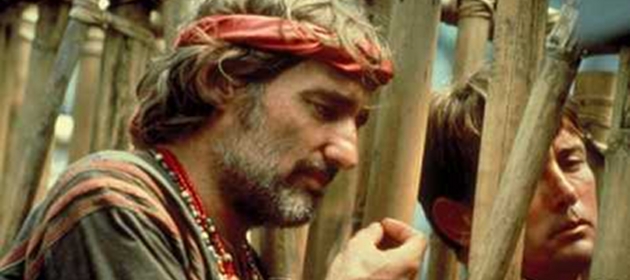
Apocalypse Now (1979)
By the late 1970s Hopper was a mess. His drink and drug habit was out of control and directors were loathe to work with him. What he really needed right then was to head to the jungle with Francis Ford Coppola...
Against all the odds, Hopper's turn as the spaced-out war photographer going badly native works brilliantly in the sprawling Vietnam war film. He's just the shot of capering mania it needs before sinking into Marlon Brando's downbeat murmerings as Kurtz.
It did little to patch up his image as an out-of-control wild man though.
Hop Triv – The character of the photojournalist (he's never given a name) was inspired by real life snapper Tim Page.
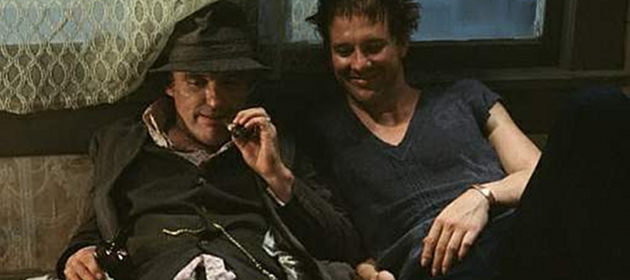
Rumble Fish (1983)
Playing Matt Dillon and Mickey Rourke's alcoholic father in Francis Ford Coppola drama about gang life on the streets wasn't much of a stretch for Hopper. At his worst depths of excess, Hopper was putting away half a gallon of rum, 28 beers and three grams of coke... a day.
The film's a bit of a mess – style over substance in the way of most Coppola films post- Apocalypse Now – but Hopper's moments with the two younger actors as their maudlin drunk dad are touching.
Hop Triv - "I hire Hopper for the 2 percent of ultimate brilliance, not the 98 percent horseshit" claimed Francis Ford Coppola.
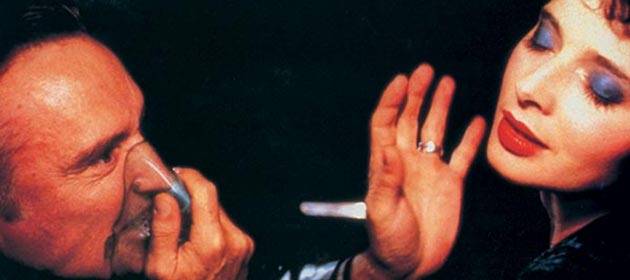
Blue Velvet (1986)
The best performance of his career. Drifting through the mediocre and the downright bleeding awful ( The Texas Chainsaw Massacre 2 , anyone), Hopper jumped at the chance to play gas snorting psycho Frank for David Lynch.
“I've got to play Frank because I am Frank!” he's said to have told Lynch. He certainly knew what the character needed.
The original script called for him to inhale helium in the scene with Isabella Rossellini. It was Hopper, who had a much greater knowledge of recreational pharmaceuticals, who suggested that it be changed to amyl nitrate.
Hop Triv – Ironically, Hopper had finally cleaned up his act just before making the film. “I had just gotten out of rehab," he laughed. "I wasn't even sober like a month and a half."
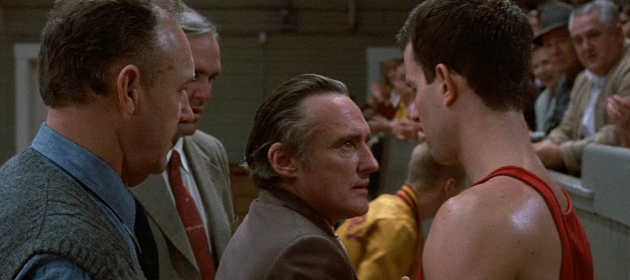
Hoosiers (1986)
Released as Best Shot over here, this basketball drama is the only movie for which Hopper ever got Oscar nominated as an actor.
He pulled down the best supporting actor nom for his turn as the alcoholic assistant to Gene Hackman's high school hoops coach, helping the team go from zeroes to heroes and reconnecting with his estranged son in the process.
It's a sweet, understated turn, one of the few in Hopper's career that leaves you longing to give him a big old hug.
Hop Triv – It's a fun film, but even Hopper couldn't believe he got Oscar nominated for this and not Blue Velvet. “ HOOSIERS ? You’re kiddin’ me, man” he roared when he heard the news.
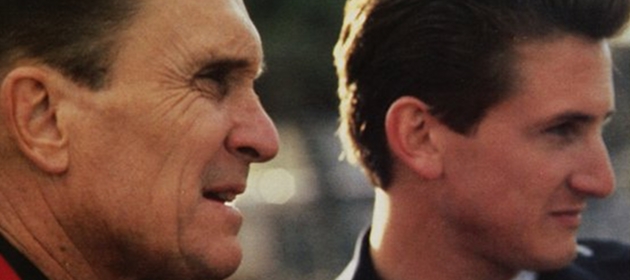
Colors (1988)
Hopper returned to directing with this corking drama about two cops (Robert Duvall and Sean Penn) battling gang violence on the streets of LA.
Restrained, intelligent and yet at the same time ferocious, it leaves you wishing that Hopper had helmed more films (he made two more after this, 1989's Chattahoochee and 1990's The Hot Spot ). He certainly agreed.
“The only regret I could have is that I wasn't directing movies,” he once said of of his dark drink and drugs days.
Hop Triv - After being cast by Hopper in Colors , Sean Penn returns the favour, giving Hopper a small role in his directorial debut The Indian Runner (1991).
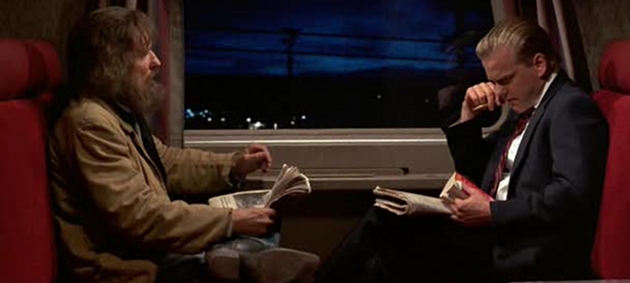
Flashback (1990)
By the nineties, Hopper was sane and secure enough to even be able to laugh at himself. Here he's hippy draft dodger Huey finally brought to justice decades later by Kiefer Sutherland's straightlaced FBI man.
It's a great little movie with a capering, grinning Hopper having a fine time spoofing the doped up counterculture king that he once was. “You can't just go to your local video store and rent Easy Rider to be a rebel," he snarls to some wannabes at one point.
Hop Triv – He and Kiefer Sutherland got on so well that when Sutherland needed someone to play uber baddie Victor Drazen in the first series of 24 , it was Hopper he hired.
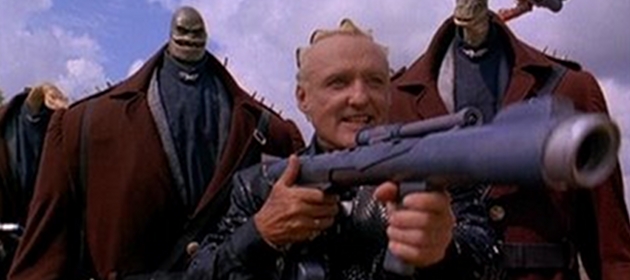
Super Mario Bros (1993)
Bob Hoskins and John Leguizamo are the world-saving plumbers in this shocker of a video game adaptation, while Hopper turns up as chief lizardy baddie King Koopa.
What on earth were any of them doing in this primary-coloured turkey? We can only assume Hopper needed a large check to pay for his latest chunk of art (he was a major-league collector on the quiet). Either that or he really wanted to see what he'd look like with bleached blonde hair and a forked tongue.
Hop Triv – Hopper's six-year old son asked him why he made such a bad movie. According to Hopper, “I said, 'Well Henry, I did that so you could have shoes.' And he said, 'Dad, I don't need shoes that badly.'"
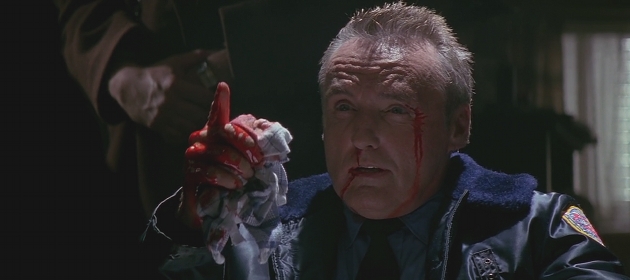
True Romance (1993)
They only get one scene together, but the sequence where Christopher Walken's mobster Coccotti ties up and prepares to torture Hopper's Clifford Worley is the high-spot of the movie.
Knowing that he's doomed whether or not he reveals the whereabouts of his son Clarence (Christian Slater), Clifford instead taunts the gangster with a story about the origins of Sicilian's dark hair and skin.
Watching the two of them grandstand, bouncing lines off each other, maintaining the menace even as you – and they – start to snigger, leaves you breathless.
Hop Triv – Hopper reckons that he and Walken kept scrupulously to the script (originally penned by Quentin Tarantino). The only bits of improv were the words "egg plant" and "cantaloupe".
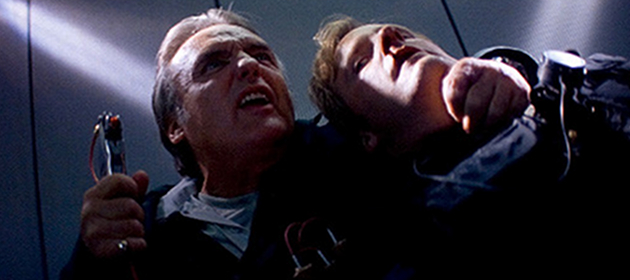
Speed (1994)
Hopper was already in the Hollywood phonebook under “rent-a-villain” before Speed came along, but his mad bomber turn here earned him, ahem, 'speed' dial status from any casting agent looking to add some edge to their movie's bad guy.
Snarling lines like “I drop this stick, and they pick your friend here up with a sponge! Are you ready to die, friend?” he joins Sandra Bullock in stealing this movie out from under theoretical star Keanu Reeves.
Hop Triv – Hopper never feared typecasting. He was glad just to be working: ”God, I’m just lucky if I get a villain part every once in a while...”
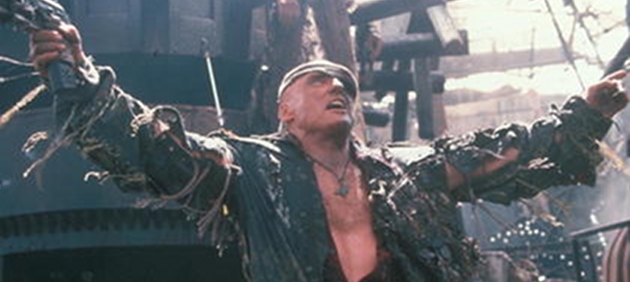
Waterworld (1995)
Okay, so the film's no great shakes, but Hopper's outing as eye-rolling, post-apocalyptic madman Deacon is great fun, pure and simple.
Hopper was often scathing about the movies he took for cash (“It's a river of shit out of which I try to pan some gold”), but he always had a soft spot for this uber-turkey.
“I think the studio sort of shot themselves in the foot by announcing it was so over budget, blah blah blah, it's going to be a failure,” he said. “All this came out before we released it in the States. But I enjoyed it.”
Hop Triv – Hopper partly took the role because he fancied spending four months in Hawaii, a place he'd never been to before.
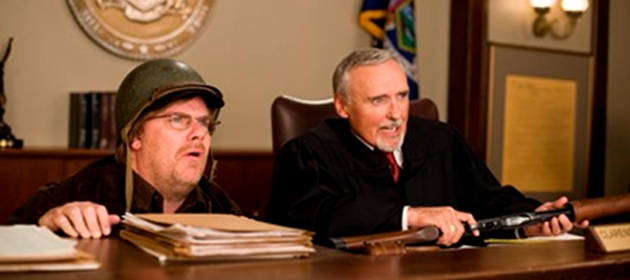
Big Fat Important Movie (2009)
The last Hopper film released before his death isn't great (though he still has another one in postproduction). A sloppy comedy riffing on A Christmas Carol , he only took his brief appearance as a judge because Kelsey Grammer asked him to. “I haven't seen it. Doubt I will,” Hopper said of the film.
The last decade and a half saw Hopper mixing and matching forgettable outings as villains with the occasional small budget flick or oddity (he got to play Frank Sinatra in The Night We Called It A Day , for instance).
He did a lot of telly work, cropping up on 24 and Las Vegas as well as getting his own short-lived shows E-Ring and Crash . He also worked on his photography, something that James Dean encouraged him to do way back on the set of Rebel Without A Cause .
Hop Triv – When it came to boiling down his own career, no-one did it better than Hopper. “There are moments that I've had some real brilliance,” he said. “Sometimes, in a career, moments are enough." They certainly are...
Weekly digests, tales from the communities you love, and more
You are now subscribed
Your newsletter sign-up was successful
Want to add more newsletters?

Every Friday
GamesRadar+
Your weekly update on everything you could ever want to know about the games you already love, games we know you're going to love in the near future, and tales from the communities that surround them.

Every Thursday
GTA 6 O'clock
Our special GTA 6 newsletter, with breaking news, insider info, and rumor analysis from the award-winning GTA 6 O'clock experts.

Every Friday
Knowledge
From the creators of Edge: A weekly videogame industry newsletter with analysis from expert writers, guidance from professionals, and insight into what's on the horizon.

Every Thursday
The Setup
Hardware nerds unite, sign up to our free tech newsletter for a weekly digest of the hottest new tech, the latest gadgets on the test bench, and much more.

Every Wednesday
Switch 2 Spotlight
Sign up to our new Switch 2 newsletter, where we bring you the latest talking points on Nintendo's new console each week, bring you up to date on the news, and recommend what games to play.

Every Saturday
The Watchlist
Subscribe for a weekly digest of the movie and TV news that matters, direct to your inbox. From first-look trailers, interviews, reviews and explainers, we've got you covered.

Once a month
SFX
Get sneak previews, exclusive competitions and details of special events each month!
